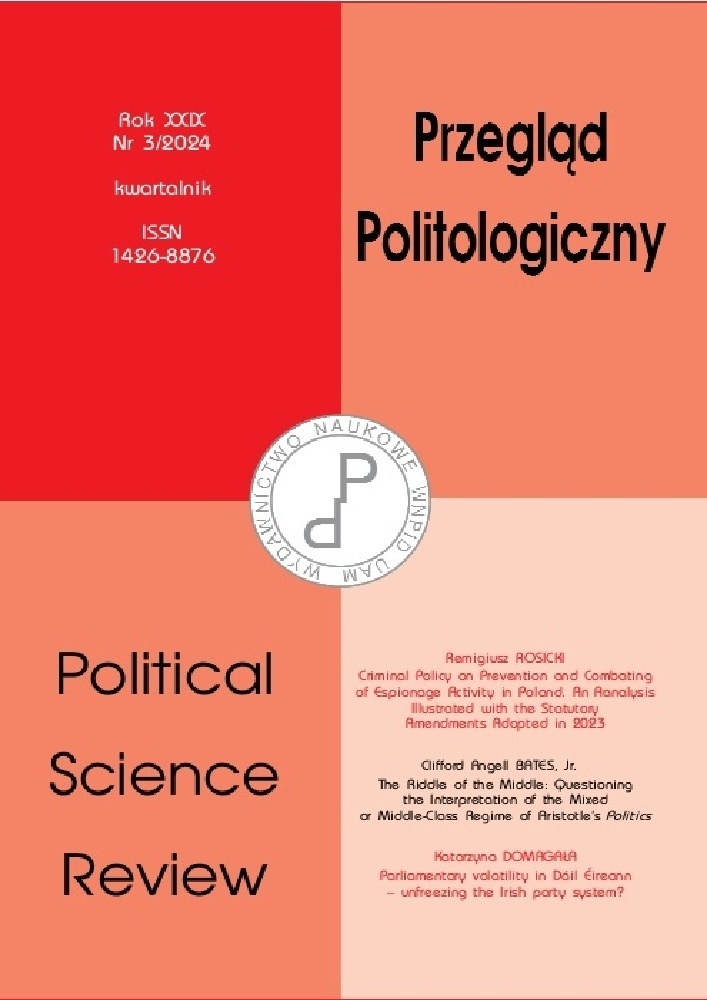Abstract
The Maghreb states and their societies share many similarities, nevertheless, the level of political activity of women and the scale of female political leadership is not one of them. Women’s participation in political life is highly diversified and differs significantly among the countries of the region. The key aim of the article is to outline and analyse the scope and forms of women’s political activity and leadership in the four Maghreb countries: Algeria, Libya, Morocco and Tunisia. The paper focuses on women’s presence in the parliament and in the government as well as their political leadership, including party leadership. The analysis is based on critical review of scientific literature, analytical studies and news presented by reputable media outlets. For the purpose of showing both similarities and differences between the four states comparative approach is adopted. Major changes that took place in Maghreb’s political sphere during the last decade are recalled in the paper as well as social and cultural context in which they are located. Historical perspective is also taken into consideration in the course of the analysis.
References
A‘ḍā’ al-ḥukūma, Al-Ğumhūriyya at-Tūnisiyya, Al-Bawwāba al-ḥukūma at-tūnisiyya, http://www.tunisie.gov.tn/38-%D8%A3%D8%B9%D8%B6%D8%A7%D8%A1-%D8%A7%D9%84%D8%AD%D9%83%D9%88%D9%85%D8%A9.htm, 15.03.2023.
A‘ḍā’ al-ḥukūma, Al-Mamlaka al-Maġribiyya, Ra’īs al-ḥukūma, https://www.cg.gov.ma/ar/node/10408, 15.03.2023.
Board of the House of Representatives: Eleventh legislature (2021–2026), House of Representatives, https://www.chambredesrepresentants.ma/en/board-house-representatives-eleventh-legislature-2021-2026, 15.06.2023.
Chodubski A. (2008), Wstęp do badań politologicznych, Wydawnictwo Uniwersytetu Gdańskiego, Gdańsk.
Codifying Autocracy: The Proposed Tunisian Constitution in Light of International Law and Standards (2022), International Commission of Jurists, https://www.icj.org/wp-content/uploads/2022/07/Tunisia-proposed-new-constitution-Legal-briefing-2022-ENG.pdf, 19.06.2023.
Context and Projected Outcome of the Presidential Coup in Tunisia (2021), Arab Center for Research & Policy Studies, https://www.dohainstitute.org/en/PoliticalStudies/Pages/The-Presidential-Coup-over-the-Tunisian-Constitution.aspx, 19.06.2023.
Danecki J. (2007), Podstawowe wiadomości o islamie, Wydawnictwo Akademickie DIALOG, Warszawa.
Election for Tunisian Assembly of People’s Representatives (2022), International Foundation for Electoral Systems, 17.12.2022, https://www.electionguide.org/elections/id/3961/, 20.06.2023.
Elections in Tunisia: 2022 Parliamentary Elections (2022), International Foundation for Electoral Systems, 9.12.2022, https://www.ifes.org/tools-resources/election-snapshots/elections-tunisia-2022-parliamentary-elections, 20.06.2023.
Farouk M. (2023), Analysis: Tunisia’s male-dominated parliament deals blow to women’s gains, Reuters, 14.02.2023, https://www.reuters.com/world/africa/tunisias-male-dominated-parliament-deals-blow-womens-gains-2023-02-14/, 18.06.2023.
Gómbar E. (2008), Kmeny a klany v arabském Maghribu, Karolinum, Praha.
Horden P., Purcell N. (2000), The Corrupting Sea. A Study of Mediterranean History, Blackwell Publishing.
La Tunisie de Saïed : privilégier le dialogue et redresser l’économie. Rapport Moyen-Orient et Afrique du Nord N°232 (2022), International Crisis Group, https://www.crisisgroup.org/fr/middle-east-north-africa/north-africa/tunisia/232-la-tunisie-de-saied-privilegier-le-dialogue-et-redresser-leconomie, 18.06.2023.
Labor force, female (% of total labor force) – Tunisia, The World Bank, https://data.worldbank.org/indicator/SL.TLF.TOTL.FE.ZS?locations=TN, 18.06.2023.
Lahbib K. (2022), Morocco, Algeria and Tunisia: A Return to Authoritarianism after the Revolutions?, in: Social Movements and Politics During COVID-19. Crisis, Solidarity and Change in a Global Pandemic, eds. B. Bringes, G. Pleyers, Bristol University Press. DOI: https://doi.org/10.2307/j.ctv2qnx5gh.31
Marciniak E. M., Załęski P. (2007), Człowiek w świecie polityki, in: Społeczeństwo i polityka. Podstawy nauk politycznych, eds. K. A. Wojtaszczyk, W. Jakubowski, Oficyna Wydawnicza ASPRA-JR, Warszawa.
Marwane A. (2021), Algeria’s new elections law threatens to derail progress on women’s participation in country politics and leadership, Fikra Forum, 15.09.2021, https://www.washingtoninstitute.org/policy-analysis/women-and-politics-algeria-one-step-forward-two-steps-back, 17.06.2023.
Mouline S., Ozlu O., Herzog L. (2022), A big step forward for women’s leadership in Morocco, World Bank Blogs, 19.01.2022, https://blogs.worldbank.org/arabvoices/big-step-forward-womens-leadership-morocco, 18.06.2023.
Murthy C. S. R. (2018), United Nations and the Arab Spring: Role in Libya, Syria, and Yemen, “Contemporary Review of the Middle East”, vol. 5(2), pp. 116–136, DOI 10.1177/2347798918762198. DOI: https://doi.org/10.1177/2347798918762198
Nabila Mounib enfin élue députée (2021), Maroc Hebdo, 10.09.2021, https://www.maroc-hebdo.press.ma/nabila-mounib-deputee, 18.06.2023.
Najla Boudin. Biography, Council of Women World Leaders, https://www.councilwomenworldleaders.org/najla-bouden.html, 18.06.2023.
New Tunisia electoral law ‘eliminates’ gender parity: HRW (2022), Aljazeera, 4.11.2022, https://www.aljazeera.com/news/2022/11/4/new-tunisia-law-eliminates-gender-parity-hrw, 20.06.2023.
Niziński P. (2014), Libia – od arabskiej wiosny do państwa zagrożonego rozpadem, in: Arabska Wiosna w Afryce Północnej. Przyczyny, przebieg, skutki, ed. E. Szczepankiewicz-Rudzka, Księgarnia Akademicka, Kraków.
Ouided Bouchamaoui. Nobel Peace Prize Laureate 2015, The Democracy & Culture Foundation, https://www.democracyculturefoundation.org/who-we-are/leadership-council/ouided-bouchamaoui/, 19.06.2023.
Proportion of seats held by women in national parliaments (%), The World Bank, https://data.worldbank.org/indicator/SG.GEN.PARL.ZS?end=2022&locations=MA-TN-DZ-LY&start=1997&view=chart, 15.04.2023.
Robbins M. (2022), Democracy in the Middle East & North Africa, Arab Barometer, https://www.arabbarometer.org/wp-content/uploads/ABVII_Governance_Report-EN-1.pdf, 21.06.2023.
Roche M. (2022), Gender Attitudes and Trends in MENA, Arab Barometer, https://www.arabbarometer.org/wp-content/uploads/ABVII_Gender_Report-ENG.pdf, 21.06.2023.
Ryszka F. (1984), Nauka o polityce. Rozważania metodologiczne, Państwowe Wydawnictwo Naukowe, Warszawa.
Skarżyńska K. (2002), Podstawy psychologii politycznej, Zysk i S-ka, Poznań.
Sławek J. (2011), Jemen – świat wartości plemiennych, Ibidem, Łódź.
Sobhani D. (2021), Gender Quotas and Women’s Political Representation: Lessons from Morocco Georgetown Institute for Women, Peace and Security, 21.07.2021, https://giwps.georgetown.edu/gender-quotas-and-womens-political-representation-lessons-from-morocco/, 15.06.2023.
Standing Committees in the House of Representatives (2021–2026 Legislature), House of Representatives, https://www.chambredesrepresentants.ma/en/standing-committees-house-representatives-2021-2026-legislature, 15.06.2023.
Tadlaoui D. et al. (2021), EU support for women’s political participation and leadership under the EU’s Gender Action Plan. A case study on Morocco, European Democracy Hub, https://epd.eu/wp-content/uploads/2021/12/gap-morocco-final.pdf, 10.03.2023.
Taškīla al-ḥukūma, Al-Ğumhūriyya al-Ğazā’iriyya ad-Dīmūqrāṭiyya aš-Ša‘abiyya, Maṣāliḥ al-Wazīr al-Awwal, https://premier-ministre.gov.dz/ar/gouvernement/composition, 10.03.2023.
Tavana D. L. (2014), Preparing to draft a new social contract: Tunisia’s National Constituent Assembly election, 2011, Princeton University, Innovations for Successful Societies, https://successfulsocieties.princeton.edu/sites/g/files/toruqf5601/files/Tunisia%20Elections_TOU_1.pdf
The Nobel Peace Prize 2015, The Nobel Prize, https://www.nobelprize.org/prizes/peace/2015/press-release/, 22.06.2023.
What’s holding back the private sector in MENA? Lessons from the MENA Enterprise Survey (2016), The World Bank, https://www.enterprisesurveys.org/content/dam/enterprisesurveys/documents/reports/MENA/MENA-Business-Climate-2016.pdf, 22.06.2023.
Wolf A. (2020), The Counterrevolution Gains Momentum in Tunisia: The Rise of Abir Moussi, POMED. Project on Middle East Democracy, https://pomed.org/wp-content/uploads/2020/11/201118b_WolfSnapshot.pdf, 21.06.2023.
Zdanowski J. (2011), Bliski Wschód 2011: bunt czy rewolucja?, Krakowska Akademia im. Andrzeja Frycza Modrzewskiego, Kraków.
License
Copyright (c) 2024 Agnieszka Syliwoniuk-Wapowska

This work is licensed under a Creative Commons Attribution-ShareAlike 4.0 International License.

